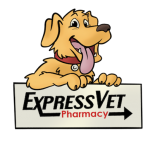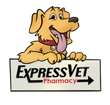Roll over images to zoom in
- Description
- Ingredients
- Instructions
- FAQ
Description
Furosemide Oral Liquid is an ExpressVet exclusive medication that prevents fluid buildup in the lungs and abdomen of dogs, or cats, with congestive heart failure and some types of kidney diseases. Furosemide is a loop diuretic, promotes diuresis, the process of extra urination, and helps manage fluid retention so your pets’ body can get rid of excess liquids and substances. It can also be helpful in treating high blood pressure.
In other animals such as racehorses it has been used to prevent or reduce pulmonary hemorrhage, blood leakage into the lungs brought on from exercise. This medication is given by mouth to your pet, and when on Furosemide it’s important to make sure your pet is drinking plenty of water and stays hydrated.
Purchasing affordable pet medications online has never been easier! ExpressVet offers the largest selection of pet medications on planet earth. If you can't find it here, let us know and we'll get it for you! Transform your pet's life with the best pet medications available on the market today.
When it comes to something as important as your pets, you want the best medication possible without breaking the bank. When you buy ExpressVet's compounded medications, you get better value and happy pets!
Uses
Furosemide Oral Liquid is given by mouth in liquid form with or without food and works quickly in approximately 1 to 2 hours. If your pet vomits or does not feel well when taking the medication on an empty stomach, try giving it to them with food. Your pet will urinate more often when receiving this drug, so make sure they have extra fresh water nearby at all times.
This medication can cause repeated urination, if possible avoid giving it at bedtime. If the person dosing Furosemide is allergic to sulfa medications, wear gloves when handling it. We always recommend consulting with your pet veterinarian before taking.
Possible Side Effects
Furosemide Oral Liquid is safe, however some common side effects are, increased urination, nausea or vomiting, diarrhea, constipation, balance problems, a tilted head, weakness, collapse, no urine production, or a racing heart. Side effects for cats receiving a high dose can include ototoxicity.
Serious allergic reactions are rare but can include a rash, itching or swelling of the face, tongue or throat, trouble breathing and dizziness.
The medication does stop working after 24 hours, but effects can last longer in animals with kidney disease. Pets on this medication should be monitored for electrolyte imbalances and hydration. If any of the side effects continue or get worse, contact your pet’s veterinarian right away.
Drug & Food Interactions
Drug Interactions: If your pet is on any of the following medications you should use Furosemide with caution:
- Ace Inhibitors (eg. enalapril, benazepril) – May cause increased risk for hypotension.
- Aminoglycosides (eg. gentamicin, amikacin) – When used with Furosemide can cause an increased risk for nephrotoxicity and ototoxicity, including deafness.
- Amphotericin B – May increase the risk for nephrotoxicity development, hypokalemia.
- Cephalosporins (eg. cefazolin, cefovecin) – May cause increased risk for nephrotoxicity.
- Cisplatin - Increased risk for ototoxicity, including deafness.
- Corticosteroids (eg. fludrocortisone, prednisone) – May cause increased risk for GI ulceration, hypokalemia.
- Cyclosporine – May cause increased risk for hyperuricemia.
- Desmopressin – May cause increased risk for hyponatremia.
- Digoxin – Furosemide can cause induced hypokalemia and may increase the potential for digoxin toxicity.
- Insulin - Furosemide may alter insulin requirements.
- Nondepolarizing Muscle Relaxants - (eg. atracurium, tubocurarine) – Combined with Furosemide may prolong neuromuscular blockade.
- Polymyxins – May increase the risk for nephrotoxicity.
- Probenecid – Combined with Furosemide can reduce uricosuric effects.
- Salicylates - Loop diuretics can reduce excretion of salicylates.
- Succinylcholine – Combined with Furosemide may potentiate effects.
- Theophylline – The pharmacologic effects of theophylline may be enhanced when combined.
We recommend telling your veterinarian about any medications, supplements, vitamins or herbal pills that your pet is taking.
Precautions
Pets should not take this medication if they are allergic to Furosemide, cannot make urine, or have worsening kidney disease.
It should be used with caution if your pet has: Electrolyte imbalance, liver or kidney disease, dehydration, diabetes, diarrhea, vomiting, is pregnant or lactating.
Monitoring while on this medication include: Electrolyte levels, hydration status, blood sugar levels, kidney values, blood pressure, weight, and ear function.
Your veterinarian will most likely monitor your pet to be sure that the medication is working.
We recommend consulting with your veterinarian with any questions or concerns.
Active Ingredients
Furosemide
Instructions
Furosemide is given to your pet by mouth with or without food daily as prescribed by your veterinarian.
Storage Instructions
Furosemide Liquid should be stored at room temperature.
Doses
Furosemide dosage for dogs and cats should be given orally once or twice daily every 6 or 8 hours. The exact dosage will be prescribed by your veterinarian.
What if I miss giving my pet a dose? If you miss a dose, give the next dose as soon as possible. If it is almost time for the following dose, then continue with the next scheduled one and skip the missed dose. Do not give a double dose to catch up or make up for a missed dose.
FAQ
What is furosemide used for in dogs and cats?
Furosemide is a drug used to prevent fluid build up in dogs, cats, and other animals suffering from liver disease, kidney problems, or congestive heart failure.
What are the benefits of taking furosemide Liquid?
Furosemide liquid for dogs is easy to feed your pet. By reducing extra fluid in the body, it can help to reduce their symptoms such as shortness of breath and swelling in the abdomen, legs and arms, helping them feel better and improve their quality of life.
Is furosemide toxic to dogs?
If taken by accident it can cause extreme dehydration and damage to organs. If this happens, contact your veterinarian immediately.
What are the side effects of furosemide in dogs?
The most common side effects are more frequent urination.
Furosemide side effects in cats?
The most common side effects are peeing more often, dry mouth, thirst, dizziness, and weakness.
How do I give my dog furosemide?
Furosemide Liquid should be measured carefully and is given by mouth with or without food. If they do not feel well or vomit while taking it on an empty stomach, give the next doses with a meal.
Torsemide vs Furosemide?
Furosemide (Lasix) is the most commonly used loop diuretic.
How much furosemide can I give my cat?
Your veterinarian will provide the exact dosage depending on your cat's condition. The common dose for cats is 1 to 2mg/kg once or twice daily every 6 to 8 hours between doses.
Are there withdrawal symptoms from furosemide?
When the diuretics are withdrawn, your pet can potentially rebound their retention of water, sodium, and oedema, which may convince the veterinarian to continue on the medication. They might also have light-headedness and dizziness.
What should I do if my dog does not feel well or in case of an emergency?
If your pet suddenly has a bad reaction, does not feel well, collapses or cannot get up, call your veterinarian or emergency animal services immediately.
What is compounding?
Compounding is a method of preparing individualized prescription medications by licensed pharmacists. Compounding allows the practitioner, the pharmacist, and the pet owner to collaborate to create custom dosages, flavors, and dosage forms for pets to easily, safely, and effectively take their medication. Often pet owners struggle to give oral tablets which is why ExpressVet offers compounded oral liquids, transdermal gels, capsules, and treats to make taking care of your pet easy.
How do I order a compounded prescription medication for my pet?
- Sign in to your existing ExpressVet account, or create a new account.
- Select the item or item(s) you are requesting and add to your cart
- Add your pet’s information and your vet’s information.
- If you are a returning customer, you will see your previous choices available or you can add as new.
- Let us know if you want us to request a prescription from your veterinarian, or if you would like to mail in a prescription.
- Complete your billing, shipping, and payment information at checkout to complete your order.
Do all compounded medications require a prescription?
Yes, all compounded medications require a prescription. Express Vet Pharmacy is happy to request a prescription order from your veterinarian, but all prescription orders must be accompanied by a patient-specific prescription from a licensed veterinarian before an order can be shipped out.
Where is Express Vet licensed to dispense veterinary prescription medications?
We are licensed in 38 states. Alaska (AK), Arizona (AZ), California (CA), Colorado (CO), Connecticut (CT), Delaware (DE), Florida (FL), Hawaii (HI), Illinois (IL), Iowa (IA), Idaho (ID), Kansas (KS), Kentucky (KY), Massachusetts (MA) ,Michigan (MI), Minnesota (MN), Missouri (MO), Montana (MT), Nebraska (NE), Nevada (NV), New Jersey (NJ), New Mexico (NM), New York (NY), North Dakota (ND), Ohio (OH), Oregon (OR), Pennsylvania (PA), Rhode Island (RI), South Dakota (SD), Tennessee (TN), Texas (TX), Utah (UT), Vermont (VT), Virginia (VA), Washington (WA) *We Cannot Ship Compounds to WA, West Virginia (WV), and Wisconsin (WI)
Where does ExpressVet source the ingredients for compounding?
All ingredients for compounding are from FDA registered manufacturers and distributors.
How long does it take to process my prescription after the pharmacy receives it?
Once the pharmacy receives authorization to dispense from your veterinarian, compounded medications are prepared and shipped out within 1 to 2 business days.
Pet Lovers Also Bought
Pet and Vet Clinic Information
Product title
Quantity:
⚠️ This item cannot be shipped to the selected state.







